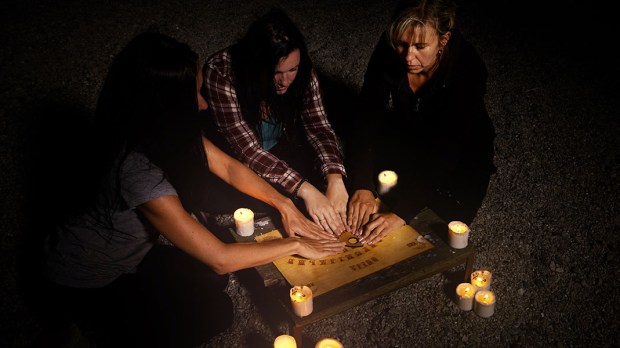Around Halloween, groups of children or adults like to take out the popular board game known as the “Ouija Board.” Even though it may seem harmless and is available for purchase at places like Walmart, it can have devastating spiritual side effects.
The premise of the Ouija board is that a living person can communicate with a soul or spirit and the spirit will communicate back by spelling out answers on the board. Many children (and adults) will play this game, saying they don’t “believe” in it and think that one of their friends is playing a joke on them when the pieces move on the board. It is often viewed as a “spooky” game to be played in a dimly lit room in the basement during a teenage sleepover.
On other occasions adults, unable to deal with the departure of a loved one, use the game in hopes of communicating with a deceased relative.
While someone using the board may not have the intention of calling a demonic spirit, the act of using the Ouija board is a form of divination (discovering hidden knowledge through supernatural means) and is very real.
The Catechism of the Catholic Church clearly teaches against divination.
All forms of divination are to be rejected: recourse to Satan or demons, conjuring up the dead or other practices falsely supposed to “unveil” the future (CCC 2116).
To make an analogy, you may not “believe” there is someone on the other end of the phone connection and may talk into it, thinking no one is listening, but the fact is that someone is listening and can communicate back.
We too often forget that there is much more to this world than meets the eye. Angels, demons, spirits and souls do exist and they can have an impact on our life. It is simply not possible to use the Ouija board as a game, as the very action of using it has profound spiritual consequences beyond our control.
One example of how this game can invite an unwanted spiritual presence is the case of a 13-year-old boy who was introduced to the Ouija board in 1949. This boy became possessed by a demon and underwent a month-long exorcism by Father William Bowdern, SJ. These events inspired the 1971 book, The Exorcist, which was put on screen in 1973.
Unfortunately, this case is not isolated, and there have been countless others over the years. Exorcists have repeatedly warned against using Ouija boards, and explain how “demons will masquerade as departed loved ones as a means of gaining possession.” Even paranormal investigators are leery about using them, knowing what kind of spirits can be invited into a person’s home.
Ouija boards are not innocent toys that can be played at Halloween parties. They can have grave spiritual consequences that can last years, leading a person down the dark path of Satan’s lies.


